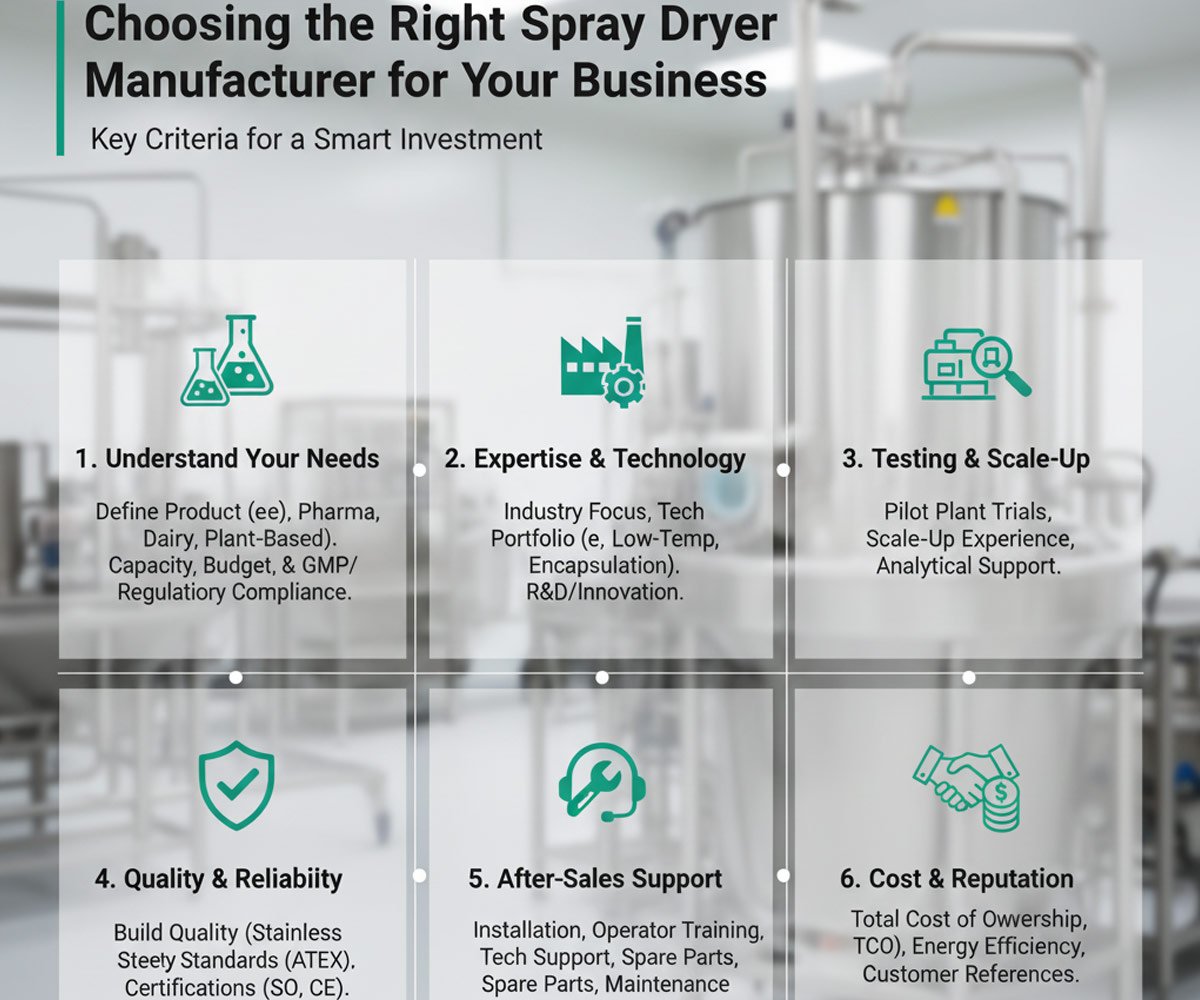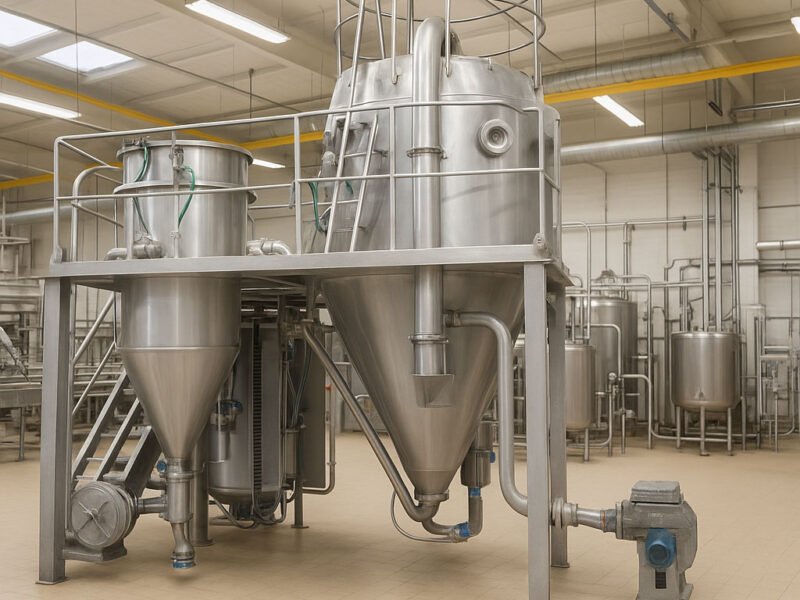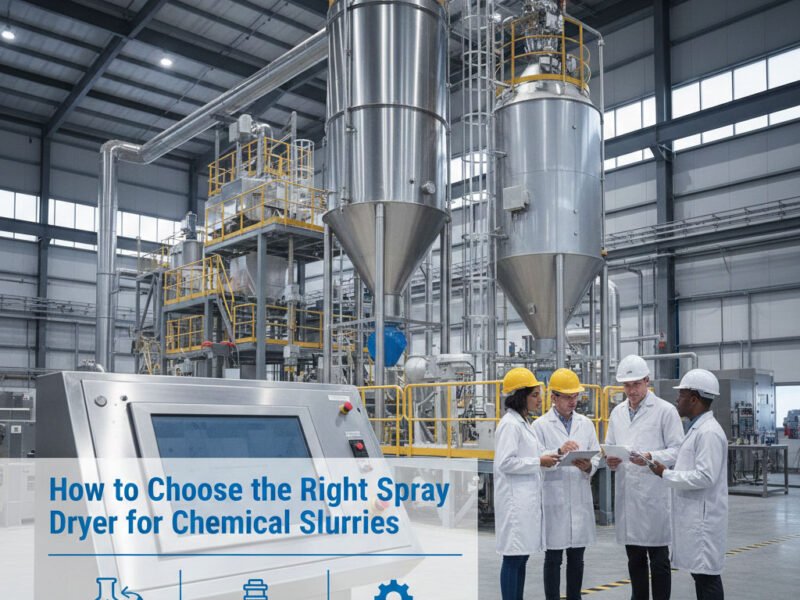Choosing the right spray dryer manufacturer is a critical decision that can significantly impact your business’s operational efficiency, product quality, and long-term success. It’s not just about buying a machine; it’s about investing in a partnership that provides expertise, support, and the right technology for your specific needs.
Here’s a comprehensive guide to help you choose the ideal spray dryer manufacturer:
Choosing the Right Spray Dryer Manufacturer for Your Business
1. Understand Your Specific Needs (Internal Assessment First)
Before even looking at manufacturers, clearly define your requirements:
- Product Characteristics: What exactly are you drying? (e.g., highly viscous, heat-sensitive, sticky, abrasive, flammable, pharmaceutical API, food extract). What are the desired powder properties (particle size, moisture content, bulk density, solubility)?
- Capacity Requirements: What is your desired production volume (kg/hr or tons/day)? Consider current needs and future scalability.
- Operating Conditions: Do you need aseptic conditions, solvent recovery, inert gas drying, or low-temperature drying?
- Budget: What is your capital expenditure budget for the equipment, installation, and associated services?
- Regulatory Compliance: (Crucial for Pharma/Nutraceuticals) Do you need GMP, FDA, ATEX, or other specific certifications?
2. Manufacturer’s Expertise and Specialization
- Industry Focus: Does the manufacturer specialize in your industry (Food, Pharma, Chemical)? Experience in your specific application (e.g., dairy, plant proteins, biopharmaceuticals) is invaluable.
- Technology Portfolio: Do they offer a range of spray dryer types (e.g., single-fluid nozzle, two-fluid nozzle, rotary atomizer, open cycle, closed cycle, pulse combustion, spray freeze drying)? A broad portfolio suggests deeper understanding.
- R&D and Innovation: Are they actively involved in research and development? Do they offer advanced features like integrated controls, energy recovery, or novel atomizer designs?
3. Testing Facilities and Pilot Plant Capabilities
- Pilot Plant Availability: Can you test your actual product on their pilot-scale spray dryer? This is crucial for validating the process, determining optimal parameters, and generating samples for market testing.
- Scale-Up Expertise: Do they have a proven methodology and experience for scaling up from pilot to commercial production? A good manufacturer will help you bridge this gap.
- Analytical Support: Do they offer analytical services to characterize the dried powder (e.g., particle size analysis, moisture content, SEM imaging)?
4. Quality, Reliability, and Safety Standards
- Equipment Quality: Inquire about materials of construction (e.g., stainless steel grades), welding standards, and overall build quality. Durability and hygiene are paramount in food and pharma.
- Safety Features: Ensure the equipment meets all relevant safety standards, especially for ATEX (explosion protection) if drying flammable materials or in explosive environments.
- Certifications: Check for ISO certifications, CE marking, or specific industry compliance standards (e.g., GMP for pharma).
5. After-Sales Support and Services
- Installation & Commissioning: Do they provide comprehensive installation and commissioning services?
- Training: Is operator training provided (on-site or off-site)? This is essential for safe and efficient operation.
- Technical Support: What kind of ongoing technical support do they offer (remote diagnostics, phone support)? What are their response times?
- Spare Parts Availability: Are spare parts readily available, especially for critical components? What is the lead time for parts?
- Maintenance Contracts: Do they offer service contracts or preventive maintenance programs?
6. Reputation and References
- Customer References: Ask for references from companies in your industry or with similar product needs. Speak directly with their existing clients about their experience with the equipment and the manufacturer’s support.
- Market Reputation: Research their reputation in the industry. Look for reviews, industry awards, and their presence at trade shows.
7. Total Cost of Ownership (TCO)
- Initial Investment: Compare the purchase price, but don’t stop there.
- Operational Costs: Consider energy consumption, labor requirements, cleaning expenses, and maintenance costs over the equipment’s lifespan.
- Yield & Efficiency: A higher-cost machine that delivers higher yield and lower energy consumption might have a better TCO.
By carefully evaluating these factors, you can make an informed decision and forge a successful partnership with a spray dryer manufacturer that aligns with your business goals and ensures optimal performance for years to come.



